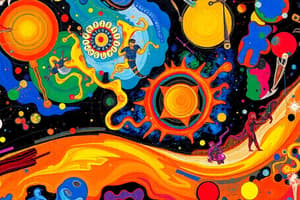Podcast
Questions and Answers
What is the age of the universe estimated to be?
What is the age of the universe estimated to be?
- 100 billion years
- 20 billion years (correct)
- 4.5 billion years
- 10 billion years
Which event is associated with the formation of the galaxies?
Which event is associated with the formation of the galaxies?
- Condensation of gases (correct)
- Explosion of supernovae
- Formation of stars
- Cooling of the sun
What primary gases were released from molten mass on early Earth?
What primary gases were released from molten mass on early Earth?
- Hydrogen, Helium, and Methane
- Nitrogen, Argon, and Ozone
- Water Vapor, Methane, Carbon Dioxide, and Ammonia (correct)
- Oxygen, Nitrogen, and Carbon Dioxide
How long after the formation of Earth did life start to appear?
How long after the formation of Earth did life start to appear?
What does the theory of 'panspermia' propose?
What does the theory of 'panspermia' propose?
Who disproved the theory of spontaneous generation?
Who disproved the theory of spontaneous generation?
What was a result of the UV rays from the sun on early Earth?
What was a result of the UV rays from the sun on early Earth?
Which of the following best describes the Big Bang theory?
Which of the following best describes the Big Bang theory?
What did the experiments conducted by S.L. Miller in 1953 demonstrate?
What did the experiments conducted by S.L. Miller in 1953 demonstrate?
Which chemical components were involved in Miller's experiment?
Which chemical components were involved in Miller's experiment?
What was a key conclusion drawn about the theory of spontaneous generation?
What was a key conclusion drawn about the theory of spontaneous generation?
What does the theory of chemical evolution suggest about life on Earth?
What does the theory of chemical evolution suggest about life on Earth?
What was not addressed in the studies of the early forms of life?
What was not addressed in the studies of the early forms of life?
Which of the following describes the conditions believed to have existed on early Earth?
Which of the following describes the conditions believed to have existed on early Earth?
When is it believed that the first non-cellular forms of life emerged?
When is it believed that the first non-cellular forms of life emerged?
What is one of the central aspects of biogenesis as described?
What is one of the central aspects of biogenesis as described?
Flashcards are hidden until you start studying
Study Notes
Origin of Life and Universe
- Life's origin is a rare event in the vast, nearly 20-billion-year-old universe.
- Earth is a small entity within immense galaxy clusters that contain stars, gas, and dust.
- The Big Bang theory describes the universe's origin as a colossal explosion, leading to expansion and cooling.
- Hydrogen and Helium formed as gases condensed due to gravitational forces, forming galaxies.
Formation of Earth
- Earth, part of the Milky Way galaxy, was formed approximately 4.5 billion years ago.
- The early atmosphere lacked a stable environment, composed of water vapor, methane, carbon dioxide, and ammonia.
- UV radiation from the sun decomposed water into Hydrogen and Oxygen, with lighter Hydrogen escaping into space.
- Oxygen reacted with ammonia and methane to generate water and carbon dioxide, facilitating ozone layer formation.
- Rain formed as water vapor cooled, filling depressions and generating oceans.
Emergence of Life
- Life on Earth is believed to have appeared about 500 million years after its formation, roughly 4 billion years ago.
- The theory of panspermia suggests that life may have originated from spores or organic materials transported from space.
- Spontaneous generation, the idea that life arose from decaying matter, was disproven by Louis Pasteur's experiments.
- Pasteur demonstrated that life only originates from pre-existing life, dismissing spontaneous generation permanently.
Theories of Chemical Evolution
- Oparin and Haldane proposed that life emerged from non-living organic molecules through chemical evolution.
- High temperatures and reducing atmospheric conditions (CH4, NH3) on early Earth facilitated complex organic molecule formation.
- In 1953, S.L. Miller simulated these conditions in a laboratory, generating amino acids through electric discharges.
- Further experiments produced sugars, nitrogen bases, pigments, and fats, supporting the notion of chemical evolution.
Development of Early Life Forms
- Meteorite analysis revealed similar organic compounds, suggesting chemical processes occurring in space.
- The first self-replicating metabolic structures might have emerged around 3 billion years ago from giant molecules (e.g., RNA, proteins).
- The first cellular forms of life likely appeared about 2 billion years ago, probably as single-celled organisms.
- All early life forms existed in aquatic environments, illustrating a slow progression of life from non-living molecules through evolutionary processes.
Studying That Suits You
Use AI to generate personalized quizzes and flashcards to suit your learning preferences.




